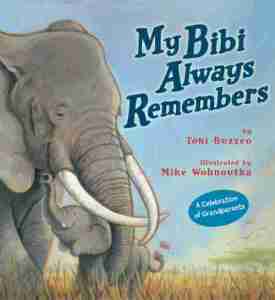 I spoke with author Toni Buzzeo upon publication of her book MY BIBI ALWAYS REMEMBERS, illustrated by Mike Wohnoutka. MY BIBI is a tale featuring the remarkable communication among elephants. I asked Toni to talk about what drew her to write this book and some of her discoveries made during her research.
I spoke with author Toni Buzzeo upon publication of her book MY BIBI ALWAYS REMEMBERS, illustrated by Mike Wohnoutka. MY BIBI is a tale featuring the remarkable communication among elephants. I asked Toni to talk about what drew her to write this book and some of her discoveries made during her research.
Do you remember the beginning of your interest in elephants?
I fell in love with African elephants on my first trip to Kenya in 1995 at Amboseli National Park.
I know you’ve been up close with them in Kenya, I think. Can you tell a little about that experience? A discovery?
It’s hard to explain the amazement factor when you first encounter elephants in the wild. They are enormous—grown males can be 13 feet tall at the shoulder and weigh 14,000 pounds! In my most recent trip in 2012, we were able to come quite close to one such bull elephant. We watched him from a distance of about 20 feet for the better part of an hour as he ate from the nearby scrub, as he napped standing with his trunk draped over one tusk, and finally as he blew dust clouds at us to let us know it was time to move on!
Most appealing to me was the view of families of elephants in long lines, the babies tucked up under an adult’s side, trekking along to food and water. It’s a beautiful and inspiring sight! The leader of the line is always the Bibi–the grandma elephant–the family matriarch. The family members are her grown female children and their children of both genders–generations of elephants living together as a group, traveling together as a family.
What are some facts about elephants’ endangerment?
African elephants are being killed in great numbers right now. Because their ivory is very valuable, especially in Asia, the largest elephants with the longest, heaviest tusks, are killed for those beautiful, curved teeth (upper incisors). According to a new study, 100,000 African elephants were killed in just three years between 2010 and 2012. During 2011, roughly one of every twelve African elephants was killed by a poacher.
In Central Africa, the elephant population has decreased by 64% in just one decade. In Cameroon in 2012, poachers with automatic weapons slaughtered hundreds of elephants in Bouba Ndjidah National Park.
In your research what’s a discovery you made about elephants’ family relationships and how they communicate?
We are still not sure of all of the ways that elephants communicate but we do know that the very deep low frequency rumbling sound they make carries over long distances. This keeps elephants in communication with other family members and also allows communications from one family to another. That’s why I begin My Bibi Always Remembers with Bibi’s call:
RUMMMMBLE!
Thirsty little Tembo hears her Bibi
Across the wide, parched plain.
And it is just this possibility of long-distance communication that is the underpinning of the story about an elephant family on a journey to find water and a little family member who repeatedly gets lost.
Would you talk about one of the illustrations you love the most?
I love the scene in which Bibi has rescued little Tembo and returned her to the family. In this scene, the elephants celebrate her return by raising their trunks and trumpeting in celebration. It perfectly captures the unity of the family and the deep regard they feel for each other. Mike Wohnoutka was so responsive to photo and video research about the elephants that I was able to provide and made sure to capture the nuances of this family celebration.
What would you most want young readers to understand about elephants?
Above all, I want children to know that elephants are very much like humans in their family relationships. They care for each other deeply over many years and take care of the each other in all circumstances, as do the elephants in little Tembo’s family who keep track of her on their journey, who rescue her when she is lost, who follow Bibi, the matriarch, as she successfully leads them to water in the time of drought.